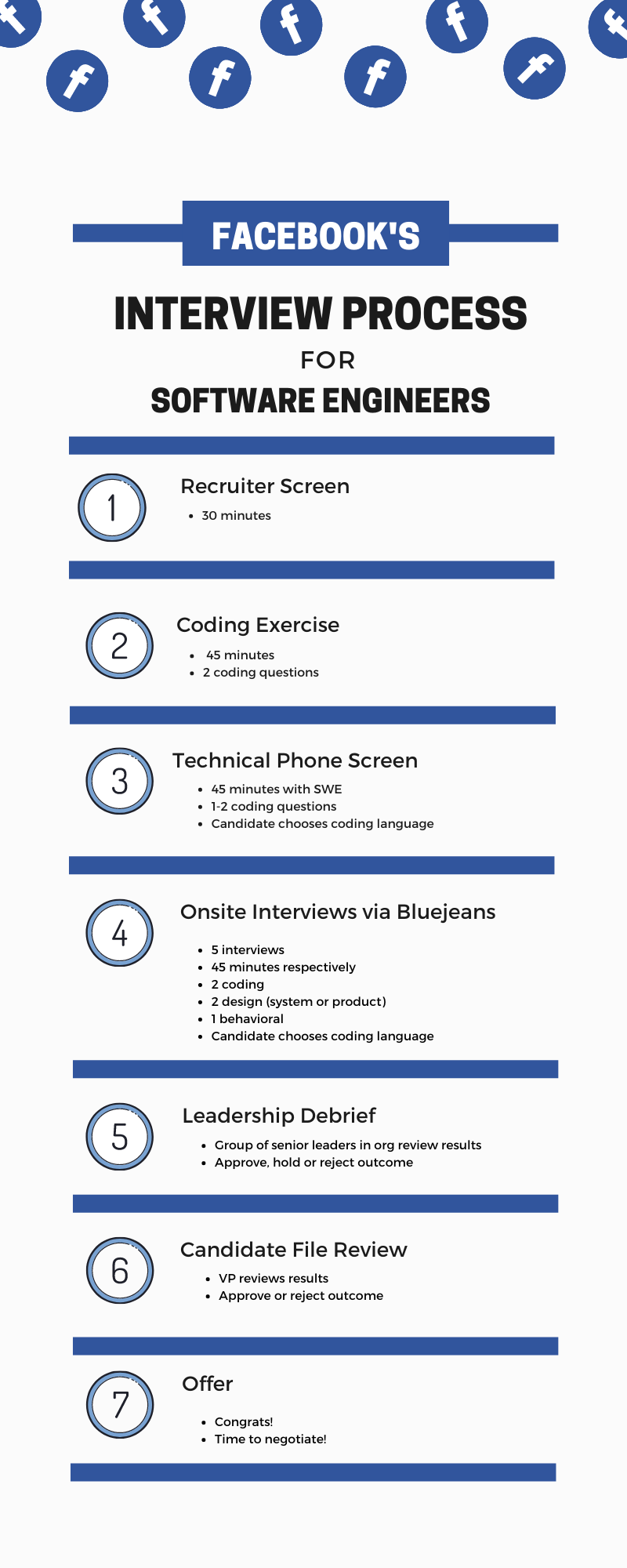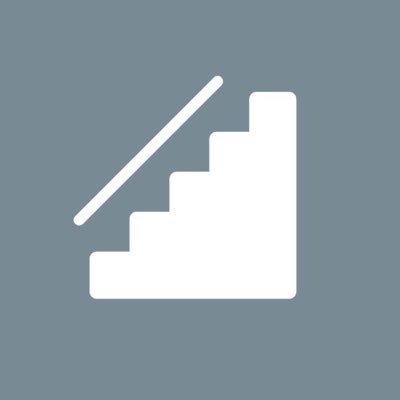Facebook has quickly become a coveted employer for Software Engineers, and was recently ranked on Levels.fyi’s End of Year Pay Report as the second highest paying companies for Staff Engineers (IV) in 2020. If you’re hoping to land an offer from Facebook, prepare to prepare! The interview process for Software Engineers can be a long arduous process, but it’s conquerable. Here is an overview of what to expect from their four to eight week process.
Call with a Recruiter
Like most interview processes with medium to large companies, the process begins with a screening call with a Recruiter. At Facebook, this call typically lasts 30 minutes. The Recruiter will ask questions regarding your professional experience, preferred coding language(s) and noteworthy projects or accomplishments. They will offer an overview of the process, timeline (four to eight weeks), and will answer general questions about teams and day to day responsibilities. Standard interview procedure.
Technical Phone Interview (Coding)
Next, you’ll be scheduled for a technical phone interview with a Software Engineer. The interviewer will make introductions (approximately five to ten minutes), then proceed to ask one to two coding questions (30 to 35 minutes). You’ll be expected to work through the problems in an online collaborator, and verbally walk the interviewer through your thought process. It’s likely that the interviewer will ask follow up questions, or possibly add constraints as you work through the problem. Common topics include: data structures, algorithms and time complexity. The final five minutes are reserved for your questions.
Onsite Interviews
Considering most Facebook employees are remote until July 2021, onsite interviews are actually digital until further notice. Still, the format remains more or less the same. Software Engineering candidates will typically have five interviews. Facebook interview categories have trendy names to spice up what many consider a grueling process: Ninja (coding), Pirate (systems) and Jedi (culture).

Onsite interviews are decidedly more difficult than the phone interview even though they follow the same format: introductions > coding > candidate questions. Questions are designed to be more complex and the evaluation process more thorough. Be prepared for a challenge, but also keep in mind interviewers are not intentionally trying to trip you up. They intend to assess your existing technical knowledge and approach to problem-solving (e.g. can you find and fix the bugs before the interviewer points them out?).
Coding | Two Interviews | 45 Minutes
Good news, you get to choose which language you’ll use in the coding interviews. After introductions, expect to solve one or two coding questions in an online platform. (If you’re granted the opportunity to interview onsite, this portion could be conducted on a white board.) It’s best practice to verbalize your thought process so the interviewer understands your logic. This also gives them the opportunity to redirect if they think your work veers in the wrong direction.
Questions may span a variety of topics including: binary trees, string, stack or list. However, it’s wise to study as many concepts as possible. Here’s a solid list of problem statements pulled from Facebook’s interview questions.
Systems & Product Design | Two Interviews | 45 Minutes
Your background will determine if the interviews focus on systems or product design. This interview block will not require any coding. It’s meant to assess how you might develop a solution to a real-life design engineering problem. Interviewers intentionally ask broad (sometimes vague) design questions, so expect these interviews to feel more like dialogue as you’re encouraged to ask questions as you develop a solution. Facebook will attempt to schedule you with an interviewer with a similar background, so the conversation is relatable, and also offers the opportunity to discuss familiar concepts.
Culture/Behavioral | One Interview | 45 Minutes
The behavioral interview focuses on the more generic sort of interview questions pertaining to your interaction with peers, work ethic and leadership experience. Although this interview may feel easy in comparison to the technical interviews, it is just as important. Poor responses that indicate lack of self-awareness or a confrontational demeanor may negatively impact your candidacy. Use Facebook’s five core values to help craft your responses to behavioral questions.
- Be Bold
- Focus on impact
- Move fast
- Be open
- Build social value
Facebook aims to craft their culture around these pillars, so it behooves you to demonstrate how you personally embody these principles in your day to day activities. Also, it’s common for interviewers to work a short coding question into the behavioral interview. It will be significantly shorter than questions asked in the technical interviews, but will still factor into the overall evaluation of your performance. Facebook wants anecdotes from your past to support your answers, and discourages the use of hypotheticals as responses.
Post Interview | Behind the Scenes
Once you complete onsite interviews you can take a deep breath. In most cases, the interview phase is over! (Occasionally, follow up interviews are requested to dive deeper into any given subject.) However, the process is not yet complete. The subsequent administrative steps happen behind the scenes, and are facilitated by your Recruiter. They should be able to offer updates as approvals are made.
Leadership Debrief
Your Recruiter will present your packet (resume, interview scores, referrals) to a group of senior executives within the organization to review. The group will discuss your interview results and recommendations. Most (if not all) parties must agree to approve your packet to move on in the process. If the group cannot come to an agreement to approve or reject a candidate packet, they may flag it and request additional interviews. As a candidate, there is not much you can do to affect this portion of the decision-making process.
Candidate Review
The final step of approvals is also administrative in nature. Once your packet is approved by the senior leaders in your (soon-to-be) organization, it is passed to the executive level for a VP to review. The VP has the authority to reject a candidate file if they perceive a troubling red flag, but this rarely happens. Overwhelmingly, the VP will give their stamp of approval, and your Recruiter will share the good news with you.
Offer | No Offer
Regardless of a positive or negative outcome, your Recruiter will call you to deliver the news. If there is no offer, they will offer feedback (albeit vague), and likely encourage you to study and try again in six months to one year. If it’s positive news, congrats, you now get to negotiate a top dollar offer!
Summary
Overall, expect the Facebook interview process to span four to eight weeks and approximately seven interviews. Interview processes do change periodically, so if your experience does not follow this exact path it’s not a negative indicator. Additional interviews, steps and approvals are common, and generally means the team wants to dive even deeper into your experience. Good luck!

Multiple offers from FAANG companies? Check out our list of top ranking 401Ks plans and how they fare against one another.

